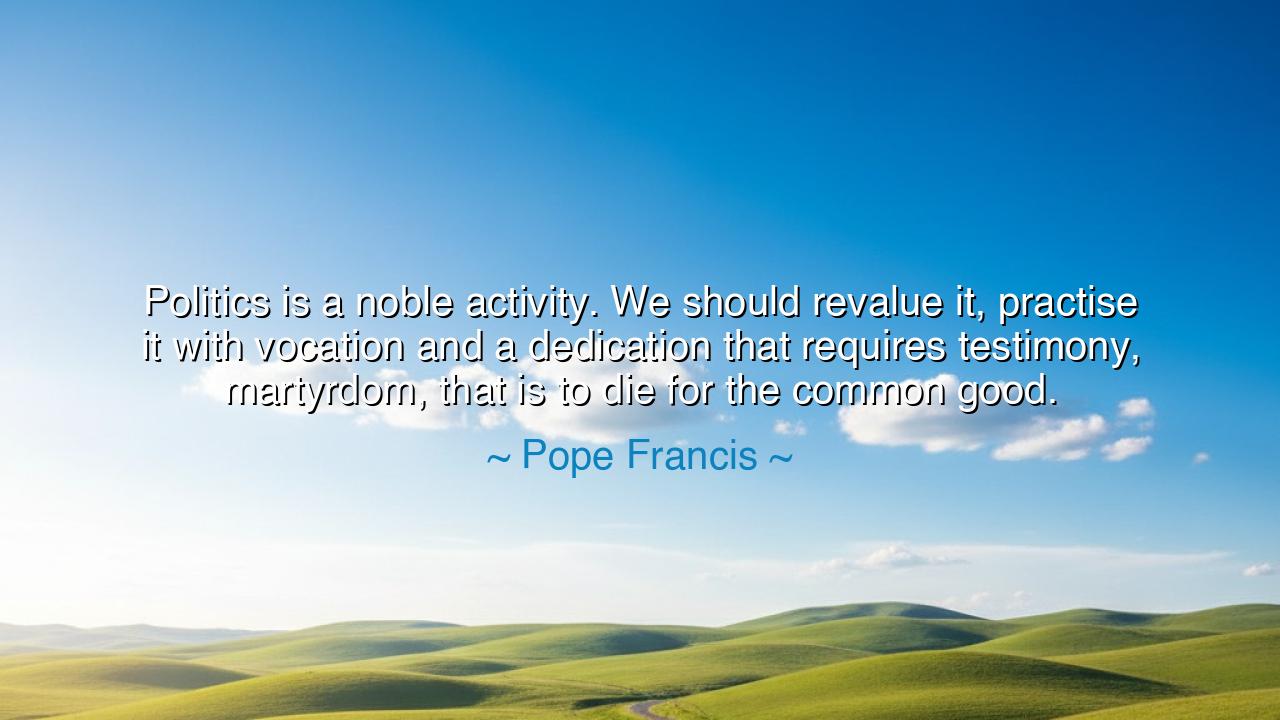
Politics is a noble activity. We should revalue it, practise it
Politics is a noble activity. We should revalue it, practise it with vocation and a dedication that requires testimony, martyrdom, that is to die for the common good.






O children of the future, listen closely to the words of Pope Francis, who speaks of the sacred nature of politics. "Politics is a noble activity. We should revalue it, practise it with vocation and a dedication that requires testimony, martyrdom, that is to die for the common good." In these words, there is a call to restore the honor and purpose of politics, a reminder that true political leadership is not about personal gain, but about the sacrifice and service to the people. The path of the true statesman is one of selflessness, a calling that demands the highest dedication to the common good, even to the point of martyrdom.
In the ancient world, the greatest leaders and heroes were those who placed the welfare of the people above their own. Socrates, the philosopher who walked the streets of Athens, did not simply seek knowledge for his own sake, but for the betterment of all. His commitment to truth and the common good led to his unjust death, as he chose to die rather than compromise his ideals. In his martyrdom, he became a symbol of the noble sacrifice that Pope Francis speaks of—the willingness to lay down one’s life for the greater good, for the truth that serves the people.
Consider also the Roman senators who stood in defiance of Julius Caesar, such as Brutus. Though Brutus’s actions led to Caesar's assassination, his reasons were rooted in his belief that the rise of one man to absolute power threatened the freedom and welfare of the Roman people. Brutus, too, in his mind, was acting in service of the common good, even at the cost of his own honor and the life he had known. He, like the great martyrs of history, understood that politics, when practiced with integrity, requires sacrifices that are beyond mere personal ambition.
In the modern age, we have witnessed the martyrdom of those who stood for the common good. Nelson Mandela, who fought against the system of apartheid in South Africa, spent years in prison, sacrificing his freedom for the dignity and equality of his people. His life was not just one of personal ambition, but of dedication to the well-being of those who had been oppressed. Even in the face of great hardship, Mandela remained true to the calling of politics as a noble cause, and in his dedication, he changed the course of history.
Let us, O children, understand the wisdom in Pope Francis's call. Politics is not just a game of power and control, but a sacred duty—a calling to serve, to protect, and to uplift the people. It is an act of martyrdom, not always in the literal sense, but in the sense that the true politician must sacrifice their personal desires, their comfort, and sometimes even their very life for the good of the whole. Just as the great leaders of the past understood, so too must we embrace the nobility of politics as a vocation—a path that demands the highest dedication, and one that can, if followed with courage and honor, lead to a world where the common good flourishes.






CTLuu Cam Tu
This quote from Pope Francis challenges the way many of us view politics. It’s easy to become disillusioned with politics, given the scandals and compromises we see in the news. But maybe, as he suggests, if politicians viewed their roles as noble and dedicated to the common good, there would be less cynicism. How can we, as citizens, encourage this mindset in our leaders? Could there be a way to make politics more about service and less about self-interest?
Lllong
Pope Francis has a very idealistic view of politics here, but I can’t help but feel skeptical. When was the last time we saw a politician truly sacrifice themselves for the common good? Are we expecting too much from people who are often more interested in power than service? Wouldn’t it be better to focus on creating a political system where politicians are more accountable, rather than expecting martyrdom from them?
THAn Thi Hang
I think Pope Francis’ statement is powerful, but it feels somewhat disconnected from the reality of politics today. Sure, politics should serve the common good, but doesn’t the pursuit of power often get in the way of that noble intention? How do we navigate the tension between political ideals and the reality of a system where self-interest often takes precedence? Can politics truly be a martyrdom in today’s climate?
TTNguyen Thu Trang
Pope Francis makes an idealistic point about politics here, framing it as something worthy of devotion and sacrifice for the greater good. But can politics still be noble in today’s world where corruption, greed, and power struggles seem to dominate? Is it possible for modern politicians to embody this kind of vocation, or has the essence of politics been corrupted by the systems they operate within? How do we return to this ideal?